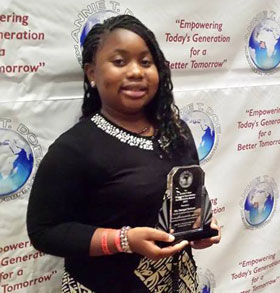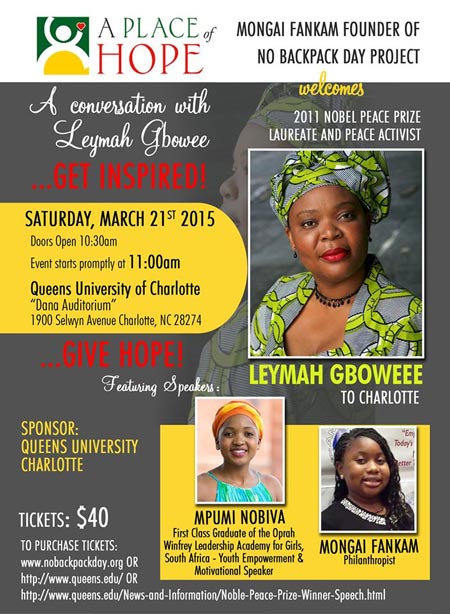“She is my 11 year old going on 50,” Abong Fankam said jokingly of her daughter, Mongai Fankam as we prepared for the interview. The comment came as Mongai insisted that she needed no help with the interview answers because it would water down her professionalism!
Whose dream is it not to have a child who recognizes at the age of eight (8) that they are so blessed it is important to reach out to the less fortunate and make a difference? This is the story of Mongai Fankam. But it also the story of her mother, is it not, breaking type from what is obtained in most third world communities and families, and cheerleading her child to do what she feels called to do in making the world a better place, regardless of her age.
As a parent from an underdeveloped country (Cameroon) that has headlined news for close to two decades about the incurable corruption of public officials, the actions of Mongai give me more than hope; they give me joy. The cures for the ailments are far away from the public sector and may belong to another generation. Herewith my interview with Mongai Fankam: the little girl who has activated her community, and well beyond, into angels for kids across Africa who lack basic school supplies.
DUNIA Magazine: Thank you so much, Mongai, for using this time to talk to us. Most kids your age are worried about their homework getting done, spending time on social media with friends or doing some other fun activity. But you are planning to host a World Noble peace prize Laureate and peace activist [Lehman Gboweee], as well as a graduate of the prestigious Oprah Winfrey Girls School in South Africa [Mpumi Nobiva]. Tell us what you are thinking ahead of that event on March 21, 2015?
 Mongai Fankam: Right now I am focusing on getting as many schools as possible to participate in our upcoming No BackPack Day event. The fact that Mrs. Gbowee is coming to support our initiative fills me with deep honor and excitement.
Mongai Fankam: Right now I am focusing on getting as many schools as possible to participate in our upcoming No BackPack Day event. The fact that Mrs. Gbowee is coming to support our initiative fills me with deep honor and excitement.
Your story — Can you please tell me the whole story as you remember it?
Mongai Fankam: I started going to Cameroon, Africa when I was 3 years old. Most of our time was spent in the villages. Each time I went, I realized that most of the kids did not have backpacks. Some of them carried their books in their hands, while others carried them in plastic bags. This made me sad. I hoped that someone will help them.
When I went back in the summer of 2011, things had not really changed. So in 2012 when I was 8 years old, I went to my school and talked to my teachers and principal about helping the kids who did not have backpacks. I asked the school if we could do a drive to collect backpacks and school supplies for the kids. I also wanted my schoolmates to have a better understanding of what it means to go to school without a backpack. With the approval of our school principal, I challenged the entire school to come to school for a day without backpacks, carrying all their books and school supplies in their hands or in plastic bags. And so my school did the first “No Backpack Day” on February 13, 2012.
That same year, 8 other schools heard about it and wanted to do “No Backpack Day” in their schools. By the end of that school year, we had collected 500 backpacks. And in the summer of that year, we took the backpacks and school supplies to Cameroon. That is how “No Backpack Day” started and is continuing to grow.
Why did you think it was important to share the struggles of these “strangers” with your classmates here?
Mongai Fankam: I think it was important to share this with my classmates here because I wanted them to see how lucky they are here for their parents to buy them new backpacks every year. I wanted them to learn not to take their backpacks for granted because some kids don’t even have backpacks.
Were you surprised by the way the idea was welcome by your classmates and the School in general?
Mongai Fankam: Yes, I was because I wasn’t expecting so many students in my school to come to school without their backpacks. 800 students out of 1,200 in my school that year came to school without a backpack. Instead they carried supplies in their hands or in a plastic bag.
How many No Backpack Days have you organized and how many backpacks have been collected and sent back to Cameroon so far?
Mongai Fankam: I have organized 6 No Backpack Days. I have collected more than 5,000 backpacks and sent some to Cameroon, Liberia, and Sierra Leone.
Queens University is hosting the event on the 21st of March. Why do you think, and are you amazed, they are supporting your initiative?
Mongai Fankam: I think they are supporting us because they are all about service work, they have gone on trips with us to Cameroon, and they believe in what I am doing. Yes, I am happy they are supporting me.
I am told that there is a school competition for this project. Can you tell us about the competition?
Mongai Fankam: Yes, there is a competition. The school that collects the most backpacks will get a reward.
What is the reward?
Mongai Fankam: The winning prize is for Leymah Gbowee to visit the school that collects the most backpacks.
You have met a US Senator, and there been invitation plans on national television talk shows including The Steve Harvey Show. How important is all of this, especially your meeting with the Senator?
Mongai Fankam: Last May I was invited to Congress to meet with Senator Chris Coons (United States Senator from Delaware and a member of the Democratic Party). I shared with him my goals and vision for the No BackPack Day project. This is important to me because with the Senators’ support, the project will reach other communities and more kids will get backpacks and school supplies.
What do your schoolmates think of the project?
Mongai Fankam: My classmates think it is a good idea because we are raising awareness for the kids that have to walk miles to school without a backpack.
Is the project having any influence on what you may ultimately do in college and in life?
Mongai Fankam: Right now, I have not really decided on what I want to do in life. However, I hope that whatever I do will be to make this world a better place for other people.
Supposing that you have mentors, what is their importance and who are they?
Mongai Fankam: The importance of my mentors is that they guide me and they help me grow. My mentors are my mom, Mrs. Leymah Gbowee, Mrs. Gwen Tanyi, Ms. Gloria King and Mrs. Sara White.
Have you been back to Cameroon to share the backpacks? If so, what reactions did you get?
Mongai Fankam: Yes, I have been back to Cameroon to share the backpacks. The reactions I got were happy and excited reactions. The kids were excited that they had backpacks and school supplies.
What would you tell someone your age or younger who is thinking of engaging in Philanthropy? Are you having fun at it?
Mongai Fankam: I would tell them to follow their dreams in being a philanthropist because it is good to help other people. I am having fun at it. It is awesome to have the title as a Philanthropist.
Any special message to someone who is thinking of coming to the event on the 21st of March but has not yet decided?
Mongai Fankam: It is going to be a great event. There will be 3 generations of African ladies sharing their stories and their vision for Africa. One of them is a Nobel Peace Prize Winner.
Please, plan to come and visit us at www.nobackpackday.org or www.queens.edu/News-and-Information/Noble-Peace-Price-Winner-Speech.html. Thanks!
Thank you, Mongai, for your commitment!
Innocent is on Twitter: @InnoChia. Blog: www.chiareport.com

